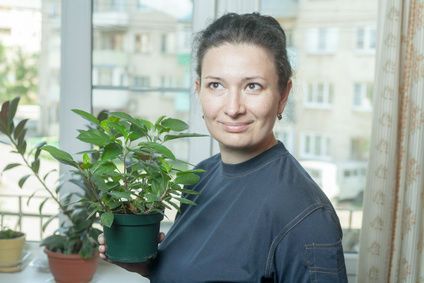
Especially in colder climates, many people tend to keep their windows and doors tightly shut in the wintertime. While this may keep the heat in, it also contributes to stuffy, dry indoor environments. It can also trap dust and other pollutants in the air for you to breathe.
Without proper attention to indoor air quality, many homes become saturated with dust, mold, dead skin residue, pet dander, and pollutants both from outside, such as pesticides and herbicides, and from inside, such as fumes from new paint and residue from new drywall and other renovations.
According to WebMD, indoor air pollution may be especially harmful for children, elderly people and those suffering from asthma. However, persistent exposure can be harmful to anyone, and may cause respiratory and cardiovascular issues, or development of allergies, over time.
The following are seven ways to easily improve the air quality in your home:
Keep your carpets and floors clean
Carpets notoriously trap indoor pollutants of all types. To keep them clean, use a vacuum with a HEPA filter once a week, and consider steam cleaning every couple of months. Investing in your own steam cleaner is wise, as professional carpet cleaning services often use harsh chemicals which can make your air even more toxic. If you steam clean yourself, you can choose to use a mixture of white vinegar and hot water to get the job done.
Mop hard floors often with a vinegar and water solution. When mopping hardwood flooring, make sure you dry with a towel immediately after mopping.
To keep your carpets and floors cleaner for longer, insist that everyone take their shoes off before entering your home, and keep floor mats by the doors to trap pollutants which may get dragged in. Clean your floor mats regularly.
Check your heating and air conditioning system
Heating and air conditioning vents and filters that have not been cleaned in a while may trap a huge amount of dust, pollen, hair and other allergens. Many systems have vents and air filters that you can easily clean yourself.
If yours are in hard to reach areas, and have not been cleaned in a long time, consider investing in a professional cleaning service. Doing this will also make your hot and cold air circulate more efficiently.
Stay away from aerosols and chemical cleaning agents
Aerosol sprays, including deodorants and household cleaners, are famous for depositing chemical residues around the home for you and your family to inhale. Synthetic cleaning products, especially those with fragrances, can emit a wide array of chemicals into the air.
These may include phthalates, which have been linked to hormone disruption. Many fragrances are derived from petroleum, which has not been tested for human safety when inhaled.
Keep the humidity in check
Dry winter air can leave your skin so dry that you want to pump up your humidifier. However, air that is too humid can be a breeding ground for mold, mildew and bacteria. Keeping your indoor humidity in the 30 to 60 percent range is recommended by the Environmental Protection Agency (EPA). Depending on the dryness of your air, you can use both humidifiers and dehumidifiers to achieve this range.
Use fans and crack open windows
Once a week, crack open your windows and let the fans run for about half an hour, unless it is bitterly cold outside. Even if it is cold, briefly opening a window or two can help freshen the air in your home and let out some pollutants that may have been accumulating. Fans are a great way to keep the air circulating in your home, which can prevent mold from flourishing.
Get a houseplant or two
Houseplants have been shown to help filter out many indoor air pollutants. Azaleas and English ivy do well in cooler temperatures, and Chinese evergreens and bamboo palms thrive in the shade. Aloe vera and chrysanthemums are two other great choices, however they require direct sunlight. Spider plants are a resilient and popular choice for first-time plant owners.
 If you have children and pets, make sure that the plants you choose are not toxic when eaten.
If you have children and pets, make sure that the plants you choose are not toxic when eaten.
Use essential oil diffusers
Essential oils are a great way to make your rooms smell wonderful, and many also have antibacterial and antifungal properties that can greatly boost the quality of your indoor air. Lavender, eucalyptus, peppermint, thyme and citrus oils are great choices. You can place diffusers in any room of the house, just make sure to keep them high up if curious young children are running around.
If you act on the above-listed guidelines, you will be breathing easier inside your home in no time.
-The Alternative Daily
Sources:
http://www.webmd.com/lung/features/12-ways-to-improve-indoor-air-quality
http://www.unifirst.com/about/pressReleases/airQuality.html
http://www.mnn.com/health/healthy-spaces/photos/15-houseplants-for-improving-indoor-air-quality/a-breath-of-fresh-air
http://www.epa.gov/mold/moldresources.html
http://www.doterraeveryday.com/using-doterra-essential-oils-to-help-counteract-bad-air-quality

